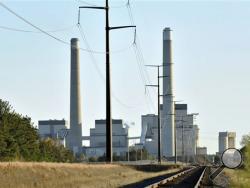WASHINGTON (AP) — The administration of President Barack Obama is vowing to press ahead with efforts to curtail greenhouse gas emissions after a divided Supreme Court put his signature plan to address climate change on hold until after legal challenges are resolved.
Tuesday's surprising move by the court is a blow to Obama and a victory for the coalition of 27 mostly Republican-led states and industry opponents, who call the regulations "an unprecedented power grab."
By issuing the temporary freeze, a 5-4 majority of the justices signaled that opponents made strong arguments against the rules. The high court's four liberal justices said they would have denied the request for delay.
The administration's plan aims to stave off the worst predicted impacts of climate change by reducing carbon dioxide emissions at existing power plants by about one-third by 2030.
White House spokesman Josh Earnest said the administration's plan is based on a strong legal and technical foundation, and gives the states time to develop cost-effective plans to reduce emissions. He also said the administration will continue to "take aggressive steps to make forward progress to reduce carbon emissions."
A federal appeals court in Washington last month refused to put the plan on hold. That lower court is not likely to issue a ruling on the legality of the plan until months after it hears oral arguments begin on June 2.
Any decision will likely be appealed to the Supreme Court, meaning resolution of the legal fight is not likely to happen until after Obama leaves office.
Compliance with the new rules isn't required until 2022, but states must submit their plans to the Environmental Protection Administration by September or seek an extension.
Many states opposing the plan depend on economic activity tied to such fossil fuels as coal, oil and gas. They argued that the plan oversteps federal authority to restrict carbon emissions, and that electricity providers would have to spend billions of dollars to begin complying with a rule that might end up being overturned.
Attorney General Patrick Morrisey of West Virginia, whose coal-dependent state is helping lead the legal fight, hailed the court's decision.
"We are thrilled that the Supreme Court realized the rule's immediate impact and froze its implementation, protecting workers and saving countless dollars as our fight against its legality continues," Morrisey said.
Implementation of the rules is considered essential to the United States meeting emissions-reduction targets in a global climate agreement signed in Paris last month. The Obama administration and environmental groups also say the plan will spur new clean-energy jobs.
In opposing the request for delay, the EPA argued that states had plenty of time to comply with the requirements as the rule is rolled out over the next 6 years.
"A stay that delays all of the rule's deadlines would postpone reductions in greenhouse gas emissions and thus contribute to the problem of global climate change even if the rule is ultimately sustained," U.S. Solicitor General Donald Verrilli said in legal filings.
Environmentalists were stunned by the court's action, which they stressed did not reflect a decision on the relative strength of the administration's case.
"The Clean Power Plan has a firm anchor in our nation's clean air laws and a strong scientific record, and we look forward to presenting our case on the merits in the courts," said Vickie Patton, a lawyer for Environmental Defense Fund, which is a party to the case.
To convince the high court to temporarily halt the plan, opponents had to convince the justices that there was a "fair prospect" the court might strike down the rule. The court also had to consider whether denying a stay would cause irreparable harm to the states and utility companies affected.
The unsigned, one-page order blocks the rules from taking effect while the legal fight plays out in the appeals court and during any further appeal to the Supreme Court, a process that easily could extend into 2017.
Justices Ruth Bader Ginsburg, Stephen Breyer, Sonia Sotomayor and Elena Kagan would have denied the request for delay.
___
Follow Michael Biesecker on Twitter at https://twitter.com/mbieseck and find his work at http://bigstory.ap.org/content/michael-biesecker
___
Follow Sam Hananel on Twitter at http://twitter.com/SamHananelAP

